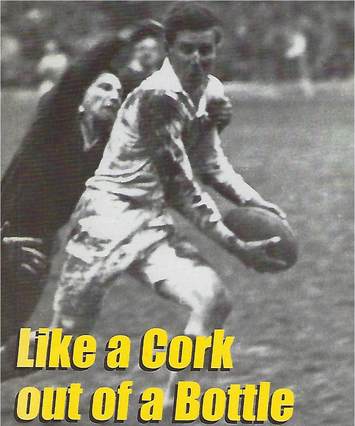I was playing in a big rugby match and in the first half made a break which led to the one try of the match. At half-time, as we crossed over, the opposing fly-half said quietly, 'Well played, Brian.'
It was only years later that I remembered this. By then he had died young. His name was Glyn Davies, a brilliant player for Cambridge and Wales. He had the longest sidestep of anyone I can remember.
How attractive sportsmanship is - and often unseen.
I grew up in a sporting world. It started with my grandfathers, both passionate sportsmen. One of them, E D Shaw, was a double-blue at Oxford in 1882 and carried his bat for 78 against the Australians that year. Later he became the first Bishop of Buckingham and the Archdeacon of Oxford - but as far as I was concerned, that was his supreme moment!
Each year on Boxing Day morning the Shaw family played the choirboys at football in Oxford's Christ Church meadows. I remember complaining that Grandpa was not a very good goalkeeper! I was about five at the time and he was seventy-five!
Dad was also keen on sports. He had opened the batting for St Mary's Hospital. He grew up in Nottingham, where his father was Medical Officer of Health for forty years. He used to tell me he had been brought up at Trent Bridge and Meadow Lane, homes of Notts cricket and Notts County football - entrance fee to each one penny! Notts County had a goalkeeper called Albert Iremonger - also a cricketer - and he used to wander out of goal. The crowd would shout, 'Get back there, Albert!' We often used that expression at home as we grew up!
Each Saturday through the winter at about 4.30 in the afternoon I would go to Ealing Broadway station, 100 yards from our home, to buy the sports edition of the evening paper. Then I would return and read every football result aloud to my father. Brentford was our nearest football team and we often went to watch them play. They were then in the Premier division.
A happy and sporting life somehow protected me from the darkness on the world scene - I was 17 in 1945. It also enabled me to overcome my intense shyness.
After school, I did my national service in the army for two years. I joined up on a Thursday and went to Warley Barracks, Brentwood. On arrival, I was immediately sent for by the sports officer. He said that he had a letter from the Secretary of the Rosslyn Park rugby club, Frank Lyall, asking if I could be released to play against London Scottish - in two days time! I was duly released, and Lyall's persistence enabled me to play regularly for Rosslyn Park throughout army service.
I often think what I owe to him - and many like him.
During my spell in the Royal Artillery I got a 'Sports' exhibition to Brasenose College, Oxford. The Principal, Stallybrass, law expert and vice-chancellor, was a passionate cricketer!
Sport continued at Oxford - as well as history. It took me to every part of Britain, many times to France, and on memorable rugby tours of South Africa and Japan.
So many memories and lessons - perhaps most of all learning to succeed one day and fail the next - and hopefully not being thrown by either. After one successful period, I played rugby for England against Wales. We lost 23-5. One reporter wrote: 'Boobbyer's play was too bad to be true.' I would like to have had that day over again!
Then in Tokyo in 1952 I took a different road. It was not a sudden decision. I was 24, and Oxford was over. I saw the Oxford rugby team off at the airport at 3.30 in the morning, and returned to my room in the old Imperial Hotel. I remember that early breakfast! Either I had made the best decision of my life, or I was a bit crazy - probably both!
'To whom much is given, much is required' has always been a special verse for me.
The next ten years I spent in Asia and America with Moral Re-Armament. During that time, I married the perfect person. But all that is another story!


